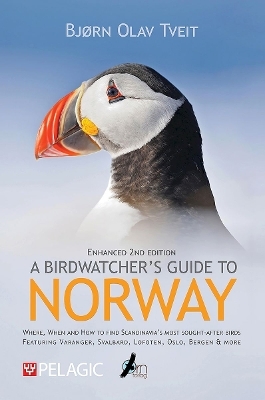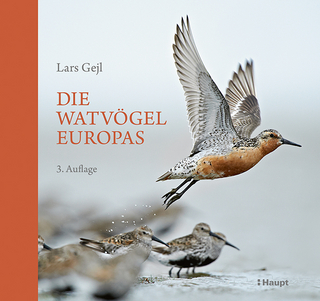
A Birdwatcher’s Guide to Norway
Where, when and how to find Scandinavia’s most sought-after birds
Seiten
2024
|
Second edition
Pelagic Publishing (Verlag)
9781784275082 (ISBN)
Pelagic Publishing (Verlag)
9781784275082 (ISBN)
A Birdwatcher's Guide to Norway helps you find all the birds of Norway and Svalbard, and guides you in detail to more than 350 of the best birdwatching sites in this beautiful and wild but still highly developed and civilised country.
The book explains in detail: where and when to go, what species to expect and hope for! The best tactics to approach each site, how to use tower hides and observation shelters and other animals you may encounter.
Norway offers some of the most sought-after species in Europe, including King Eider, Steller’s Eider, Gyrfalcon, displaying Capercaillie, Jack Snipe, Ruff and other Arctic shorebirds in full breeding plumage, singing Little Bunting and Arctic Warbler, and many more. The country can be referred to as 'an easily accessible part of Siberia'.
Packed with 265 photos, 95 maps and comprehensive information about each site, A Birdwatcher's Guide to Norway an essential travel guide essential for anyone planning a trip to watch birds in Norway or Svalbard.
A lot has changed since the first edition came out 15 years ago. This is most evident in regards to the infrastructure: roads keep improving and changing course, ferries have in some places been replaced by bridges or tunnels, new tower hides are built. Maps and text have been updated accordingly. There have been quite a few changes in bird-life as well, such as that Barred Warbler no longer breeds regularly along the Skagerrak coast, and the number of pairs of most cliff-breeding seabirds are greatly reduced to a point where e.g. Leach's Storm-Petrel is no longer to be expected on boat trips in Lofoten. On the positive side, the population of Rustic Bunting seem to be recovering, Red-flanked Bluetail is on the move into Norway, and Great Grey Owl now breeds regularly near Oslo. Furthermore, the book has been expanded to a slightly larger format, allowing for easier-to-read maps and even more stunning images taken by some of the best photographers in the country. The soft, flexible binding is more robust than that of the first edition.
The book explains in detail: where and when to go, what species to expect and hope for! The best tactics to approach each site, how to use tower hides and observation shelters and other animals you may encounter.
Norway offers some of the most sought-after species in Europe, including King Eider, Steller’s Eider, Gyrfalcon, displaying Capercaillie, Jack Snipe, Ruff and other Arctic shorebirds in full breeding plumage, singing Little Bunting and Arctic Warbler, and many more. The country can be referred to as 'an easily accessible part of Siberia'.
Packed with 265 photos, 95 maps and comprehensive information about each site, A Birdwatcher's Guide to Norway an essential travel guide essential for anyone planning a trip to watch birds in Norway or Svalbard.
A lot has changed since the first edition came out 15 years ago. This is most evident in regards to the infrastructure: roads keep improving and changing course, ferries have in some places been replaced by bridges or tunnels, new tower hides are built. Maps and text have been updated accordingly. There have been quite a few changes in bird-life as well, such as that Barred Warbler no longer breeds regularly along the Skagerrak coast, and the number of pairs of most cliff-breeding seabirds are greatly reduced to a point where e.g. Leach's Storm-Petrel is no longer to be expected on boat trips in Lofoten. On the positive side, the population of Rustic Bunting seem to be recovering, Red-flanked Bluetail is on the move into Norway, and Great Grey Owl now breeds regularly near Oslo. Furthermore, the book has been expanded to a slightly larger format, allowing for easier-to-read maps and even more stunning images taken by some of the best photographers in the country. The soft, flexible binding is more robust than that of the first edition.
Bjørn Olav Tveit (b.1970) from Oslo, Norway has been an avid birdwatcher since childhood. He has trawled the country and explored all the best birding sites. He was a long-standing member of the Norwegian Rarity Committee for Birds (NSKF) and is the nature conservation contact for a local chapter of BirdLife Norway. At times he guides nature enthusiasts who want to experience Norway’s rich birdlife. When he is not outdoors birdwatching or indoors writing books, he makes music and works in the Norwegian Ministry of Culture.
Prefaces
Welcome to Norway
The Oslo area
Interior south
Coastal Skagerrak
Western Norway
Central Norway
Northern Norway
Finnmark
Svalbard
Selected species
References
Index of sites and places
| Erscheinungsdatum | 10.07.2024 |
|---|---|
| Zusatzinfo | 100 Maps; 350 Illustrations, color |
| Verlagsort | Exeter |
| Sprache | englisch |
| Maße | 160 x 240 mm |
| Themenwelt | Sachbuch/Ratgeber ► Natur / Technik ► Naturführer |
| Naturwissenschaften ► Biologie ► Zoologie | |
| ISBN-13 | 9781784275082 / 9781784275082 |
| Zustand | Neuware |
| Informationen gemäß Produktsicherheitsverordnung (GPSR) | |
| Haben Sie eine Frage zum Produkt? |
Mehr entdecken
aus dem Bereich
aus dem Bereich
Buch | Hardcover (2019)
Quelle & Meyer (Verlag)
CHF 55,90


